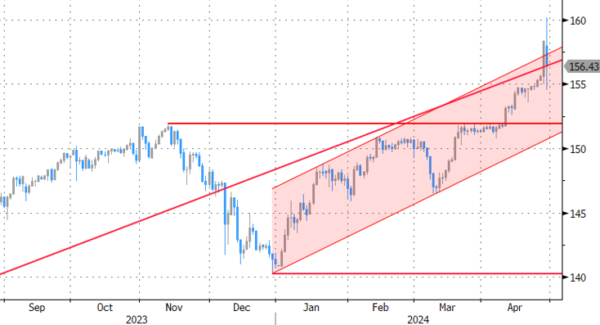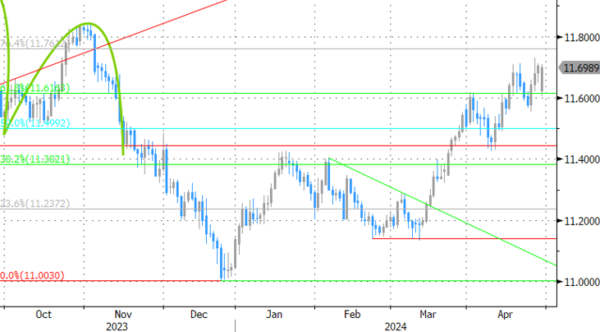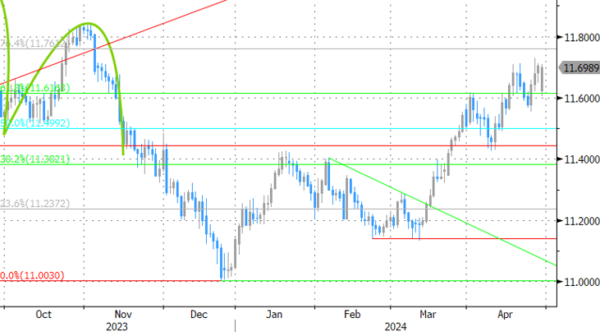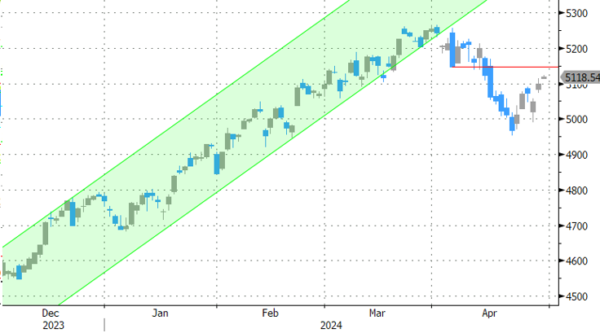Markets
Japanese markets were closed for Showa day today. Still, despite (or maybe due to) holiday thinned market conditions, the yen moved sharply up and down this morning. At first, Friday’s post BoJ yen weakening due to persistent policy divergence between the BoJ and colleagues from other developed countries continued and even accelerated. USD/JPY briefly surpassed the 160 barrier, a level not seen since April 1990. However, ‘out of the blue’ the yen regained 5-yen. Was USD/JPY 160 the line in the sand for (hidden) interventions? Japanese authorities see value in keeping their cards close to their chest and didn’t comment, but news agencies, referring to sources familiar with the matter, reported that interventions indeed occurred. Over the next days, in more normal market conditions, we will learn more on how many resources the Japanese Fin Min is prepared to put on the table and how effective their strategy might be to slow the freefall of the currency. The supposed interventions had some brief knock-effects on the dollar overall (DXY currently trades in the 105.60/70 area from 106 early in Asian dealings). However, after all, the impact on the likes of EUR/USD was limited.
Aside from the developments in Japan, preliminary April inflation data from Belgium, Spain and Germany provided a first insight in the potential outcome of the EMU inflation release scheduled tomorrow. Spanish headline inflation slightly reaccelerated to 3.4% from 3.3% on a monthly dynamic of 0.6%. Core inflation slowed slightly more than expected from 3.3% to 2.9%. German HICP inflation showed a similar picture at 0.6% M/M and 2.4% Y/Y (from 2.3%), as higher energy prices put some upward pressure on inflation dynamics. The EMU inflation path might be more bumpy in the months ahead, but today’s data don’t suggest a big upward surprise for tomorrow’s EMU flash CPI release. Such an outcome (2.4% headline, 2.6% core expected) leaves the ECB scenario for a first 25 bps June rate cut intact. After a protracted drift north, US and EMU yields today cautiously build on Friday’s ‘technical correction’. US yields are easing between 1 bp (-2-y) and 2.5 bps (10-y). German yields decline between 3 bps (2-y) and 4.5 bps (30-y). Going into key US and EMU data later this week, we don’t draw firm conclusions from today’s price action. European equites are trading mixed (EuroStoxx 50 -0.3%). The dollar is losing modest ground, maybe partially due to the decline in USD/JPY. EUR/USD rebounded to 1.071, but the technical picture remains neutral for now. In line with last week price action, sterling slightly outperforms the euro. EUR/GBP trades again in the middle of the previous consolidation pattern between 0.85 and 0.86. Markets currently still see less than two 25 bps BoE rate cuts this year compared to almost 75 bps of ECB easing. Contrary to the EMU (GDP data) and the US (ISM, Payrolls, Fed) there are few important UK data scheduled for release this week.
News & Views
The Belgian economy grew by 0.3% in Q1 2024, the National Bank of Belgium’s flash estimate showed today. GBFP as a result was 1.3% bigger compared to the same quarter last year. The initial reading only shows a sectoral breakdown. Value added rose by 0.3% q/q in industry. Activity slowed in the services sector, which nonetheless posted positive growth of 0.3%. Finally, value added in the building industry fell by 0.2%. A separate release from Statbel revealed Belgian inflation picking up from 3.18% to 3.37% in April with energy (from -1.61% to 9.19%) adding the first positive contribution since March 2023. Core inflation declined to 3.26% from 3.85% while a gauge for services inflation proved much stickier (from 5.04% to 4.93%). Inflation for rents has edged down to 5.43% from 5.62% while food (including alcoholic beverages) stood at 0.25% this month, compared to 3.21% last month.
Spanish premier Sanchez is staying in office. The socialist announced that today after withdrawing from all public appearances for several days last week. Sanchez considered quitting after a judge opened a case against his wife Begona Gomez over alleged influence-peddling and corruption on a complaint of an anti-corruption organization with far-right links. Sanchez denounced the move saying the investigation is a right-wing intimidation campaign. His resignation would most likely have toppled the current fragile minority government, resulting in snap elections in an increasingly fragmented political landscape and less than one year after the previous one. Next month is an important one politically, with Catalonia holding regional elections on May 12. It’s not yet clear whether the recent developments have affected Sanchez’s Socialist Party being on course to take power from the incumbent separatists.
Graphs
USD/JPY: yen rebounds on presumed interventions after weakening beyond USD/JPY 160 barrier.

EUR/SEK: Krone stays in the defensive as Q1 contraction suggests need for Riksbank support.

German 10-y yield: taking a breather as inflation data keep scenario for first ECB rate cut in June alive.

EuroStoxx50: still struggling to avoid sell-on upticks pattern










